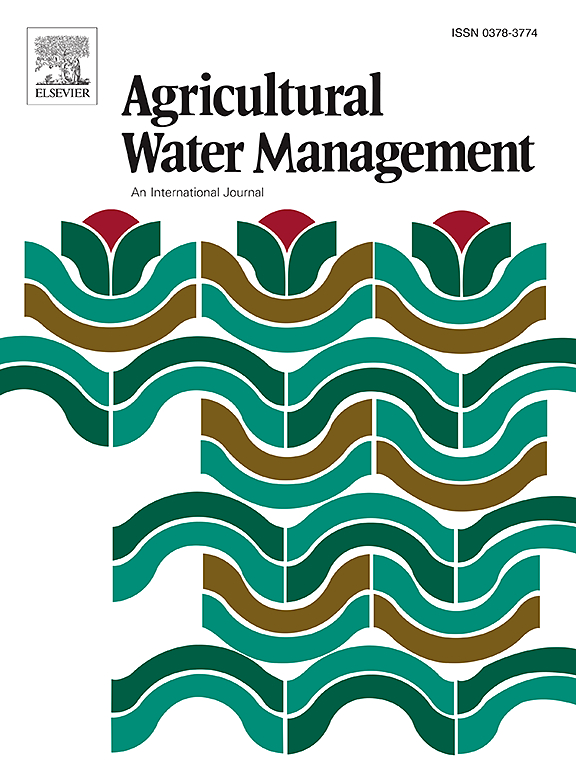用煤层水灌溉牧场土壤--关于土壤理化性质的溶液计研究
IF 5.9
1区 农林科学
Q1 AGRONOMY
引用次数: 0
摘要
从煤层中提取的地下水可能是低降雨量地区灌溉土地的一种资源,但这种水对土壤性质的影响尚需确定。利用澳大利亚昆士兰州南部四种不同土壤类型(Sodic Vertisol、Calcic Solonetz、Haplic Solonetz 和 Xanthic Lixisol)的完整土芯(直径 0.75 米,深 1.4 米)进行了溶液计研究,以研究在煤层水(电导率 (ECw) 为 3 dS/m,pH 值为 8.8,钠吸附率 (SAR) 为 100)加速灌溉下土壤物理和化学性质的变化。此外,还交替使用去离子水灌溉岩心以模拟降雨,并在浸润池中种植苜蓿(Medicago sativa L)或罗得草(Chloris gayana Kunth.)。每灌溉 450 毫米 CS 水之前,土壤表面都要用按比例添加的元素硫(1.4 吨/公顷)和石膏(2.5 吨/公顷)进行处理,以尽量减少 SAR 和 pH 值的变化。其中三块土壤(Vertisol,均为 Solonetz)由于其粘土质地,浸出率较低(≤ 0.1%),底土初始含盐量较高(ECse 1.4-4.4 dS/m)。用 CS 水灌溉后,整个土壤剖面的含盐量(EC 值)和 SAR 值逐渐增加,但 pH 值并未因地表施用的元素硫而增加。Lixisol 因其壤土质地而具有较高的水力传导性和浸出率(6.7%)--在这种土壤中,累积的盐分可以被浸出,盐度或 pH 值没有增加。尽管这种壤质土壤的 SAR 增加了,但没有观察到结构退化,而且可以持续灌溉多达 3200 毫米的 CS 水(累计灌溉量为 5400 毫米)。因此,浸出分数而非土壤化学成分是确定土壤是否适合用含盐、碱和钠的 CS 水灌溉的良好指标。本文章由计算机程序翻译,如有差异,请以英文原文为准。
Irrigation of rangeland soils with coal seam water - A lysimeter study on soil physico-chemical properties
Groundwater extracted from coal seams may be a resource for irrigation of land in areas with low rainfall, but the effect of this water on soil properties needs to be established. A lysimeter study was conducted using intact soil cores (0.75 m diameter, 1.4 m deep) of four different soil types (Sodic Vertisol, Calcic Solonetz, Haplic Solonetz and Xanthic Lixisol) from southern Queensland, Australia, to study changes in soil physical and chemical properties under accelerated rates of irrigation with coal seam (CS) water (electrical conductivity (ECw) of 3 dS/m, pH of 8.8, and a sodium adsorption ratio (SAR) of 100). Cores were also alternately irrigated with deionised water to simulate rainfall, and either lucerne (Medicago sativa L) or Rhodes grass (Chloris gayana Kunth.) where grown in the lysimeters. The soil surface was treated with stoichiometric rates of elemental sulfur (1.4 t/ha) and gypsum (2.5 t/ha) prior to every 450 mm CS water irrigation to minimise changes in SAR and pH. Three of the soils (Vertisol, both Solonetz) had low leaching fractions (≤ 0.1 %) due to their clay texture and were initially saline in the subsoil (ECse 1.4–4.4 dS/m). Irrigation with CS water resulted in a gradual increase in salt content (EC) and SAR throughout the soil profile, but pH was not increased due to surface-applied elemental sulfur. The Lixisol had a higher hydraulic conductivity and leaching fraction (6.7 %) due to is loamy texture – in this soil, accumulated salts could be leached and no increase in salinity or pH were measured. Despite an increase in SAR for this loamy soil, no structural degradation was observed, and it could be sustainably irrigated with up to 3200 mm CS water (with cumulative irrigation volume of 5400 mm). Hence, leaching fractions rather than soil chemistry are good indicators to identify soils suitable for irrigation with CS water that is saline, alkaline, and sodic.
求助全文
通过发布文献求助,成功后即可免费获取论文全文。
去求助
来源期刊

Agricultural Water Management
农林科学-农艺学
CiteScore
12.10
自引率
14.90%
发文量
648
审稿时长
4.9 months
期刊介绍:
Agricultural Water Management publishes papers of international significance relating to the science, economics, and policy of agricultural water management. In all cases, manuscripts must address implications and provide insight regarding agricultural water management.
 求助内容:
求助内容: 应助结果提醒方式:
应助结果提醒方式:


